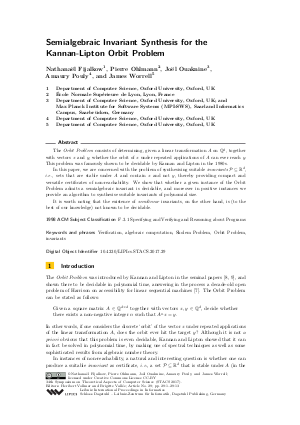Semialgebraic Invariant Synthesis for the Kannan-Lipton Orbit Problem
Authors Nathanaël Fijalkow, Pierre Ohlmann, Joël Ouaknine, Amaury Pouly, James Worrell
-
Part of:
Volume:
34th Symposium on Theoretical Aspects of Computer Science (STACS 2017)
Part of: Series: Leibniz International Proceedings in Informatics (LIPIcs)
Part of: Conference: Symposium on Theoretical Aspects of Computer Science (STACS) - License:
 Creative Commons Attribution 3.0 Unported license
Creative Commons Attribution 3.0 Unported license
- Publication Date: 2017-03-06
File

PDF
LIPIcs.STACS.2017.29.pdf
- Filesize: 463 kB
- 13 pages
Document Identifiers
Subject Classification
Keywords
- Verification,algebraic computation,Skolem Problem,Orbit Problem,invariants
Metrics
- Access Statistics
-
Total Accesses (updated on a weekly basis)
0Document
0Metadata
Abstract
The Orbit Problem consists of determining, given a linear transformation A on d-dimensional rationals Q^d, together with vectors x and y, whether the orbit of x under repeated applications of A can ever reach y. This problem was famously shown to be decidable by Kannan and Lipton in the 1980s. In this paper, we are concerned with the problem of synthesising suitable invariants P which are subsets of R^d, i.e., sets that are stable under A and contain x and not y, thereby providing compact and versatile certificates of non-reachability. We show that whether a given instance of the Orbit Problem admits a semialgebraic invariant is decidable, and moreover in positive instances we provide an algorithm to synthesise suitable invariants of polynomial size. It is worth noting that the existence of semilinear invariants, on the other hand, is (to the best of our knowledge) not known to be decidable.
Cite As Get BibTex
Nathanaël Fijalkow, Pierre Ohlmann, Joël Ouaknine, Amaury Pouly, and James Worrell. Semialgebraic Invariant Synthesis for the Kannan-Lipton Orbit Problem. In 34th Symposium on Theoretical Aspects of Computer Science (STACS 2017). Leibniz International Proceedings in Informatics (LIPIcs), Volume 66, pp. 29:1-29:13, Schloss Dagstuhl – Leibniz-Zentrum für Informatik (2017)
https://doi.org/10.4230/LIPIcs.STACS.2017.29
BibTex
@InProceedings{fijalkow_et_al:LIPIcs.STACS.2017.29,
author = {Fijalkow, Nathana\"{e}l and Ohlmann, Pierre and Ouaknine, Jo\"{e}l and Pouly, Amaury and Worrell, James},
title = {{Semialgebraic Invariant Synthesis for the Kannan-Lipton Orbit Problem}},
booktitle = {34th Symposium on Theoretical Aspects of Computer Science (STACS 2017)},
pages = {29:1--29:13},
series = {Leibniz International Proceedings in Informatics (LIPIcs)},
ISBN = {978-3-95977-028-6},
ISSN = {1868-8969},
year = {2017},
volume = {66},
editor = {Vollmer, Heribert and Vall\'{e}e, Brigitte},
publisher = {Schloss Dagstuhl -- Leibniz-Zentrum f{\"u}r Informatik},
address = {Dagstuhl, Germany},
URL = {https://drops.dagstuhl.de/entities/document/10.4230/LIPIcs.STACS.2017.29},
URN = {urn:nbn:de:0030-drops-70059},
doi = {10.4230/LIPIcs.STACS.2017.29},
annote = {Keywords: Verification,algebraic computation,Skolem Problem,Orbit Problem,invariants}
}
Author Details
References
-
Jin-Yi Cai. Computing Jordan normal forms exactly for commuting matrices in polynomial time. Technical report, SUNY at Buffalo, 2000.

- Jin-Yi Cai, Richard J. Lipton, and Yechezkel Zalcstein. The complexity of the A B C problem. SIAM J. Comput., 29(6):1878-1888, 2000. URL: http://dx.doi.org/10.1137/S0097539794276853.
-
John W. S. Cassels. An introduction to Diophantine approximation. Cambridge University Press, 1965.

- Ventsislav Chonev, Joël Ouaknine, and James Worrell. On the complexity of the Orbit Problem. Journal of the ACM, 63(3):23, 2016. URL: http://dx.doi.org/10.1145/2857050.
-
L. P. D. van den Dries. Tame Topology and O-minimal Structures. London Mathematical Society Lecture Note Series. Cambridge University Press, May 1998.

-
G. Ge. Testing equalities of multiplicative representations in polynomial time. In Proceedings of SFCS, pages 422-426. IEEE Computer Society, 1993.

-
Michael A. Harrison. Lectures on linear sequential machines. New York-Londres, Academic Press, 1969.

- Ravindran Kannan and Richard J. Lipton. The Orbit Problem is decidable. In Proceedings of STOC, pages 252-261, 1980. URL: http://dx.doi.org/10.1145/800141.804673.
- Ravindran Kannan and Richard J. Lipton. Polynomial-time algorithm for the Orbit Problem. Journal of the ACM, 33(4):808-821, 1986. URL: http://dx.doi.org/10.1145/6490.6496.
- David W. Masser. Linear relations on algebraic groups. In Alan Baker, editor, New Advances in Transcendence Theory, pages 248-262. Cambridge University Press, 1988. URL: http://dx.doi.org/10.1017/CBO9780511897184.016.
- Joël Ouaknine and James Worrell. Ultimate positivity is decidable for simple linear recurrence sequences. In Proceedings of ICALP, pages 330-341, 2014. URL: http://dx.doi.org/10.1007/978-3-662-43951-7_28.
-
Terence Tao. Structure and Randomness. AMS, 2008.

